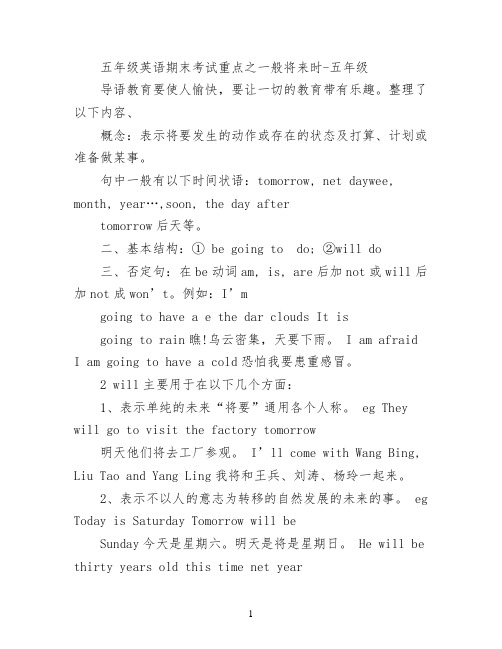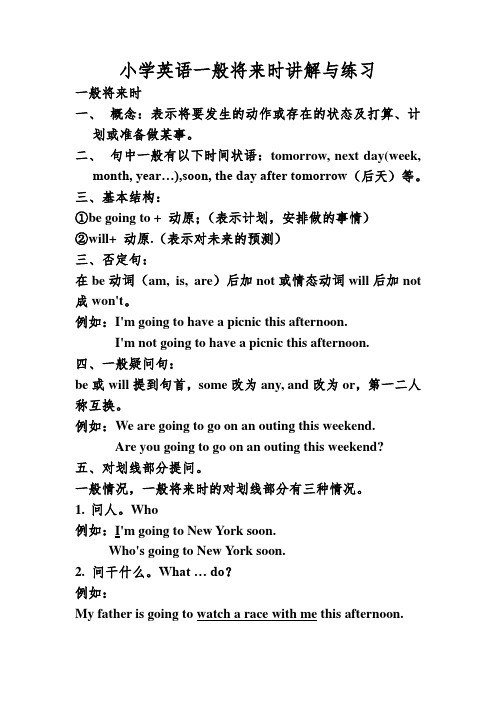小学五年级英语提高阅读一般将来时
- 格式:doc
- 大小:23.50 KB
- 文档页数:4

1. We often play(play) in the playground.2. He gets (get) up at six o’clock.3. Do you brush (brush) your teeth every morning?4. What does(do) he usually do(do) after school?5. Danny studies (study) English, Chinese, Math, Science, and Art at school.6. Mike sometimes goes (go) to the park with his sister.7. At eight at night, she watches(watch) TV with his family.8. Does Mike read (read) English every day?9. How many lessons does your classmate have(have) on Monday?10. What time does his mother do(do) the housework?Passage1Jim is an English boy. He comes to China with his father and mother. They come here to work. Jim comes here to study.He is in No.5 Middle School. He gets up early every day. He isn’t late for school. He studies hard. He can read English well. He often helps us with our English, and we often help him with his Chinese. After class he likes playing football, swimming, running, jumping and riding. He makes many friends here. We are glad to stay with him. On Sunday he often helps his mother clean the house, mend something or do the shopping. He likes Chinese food very much..He likes living here. He likes Chinese students very much. We all like him, too.根据短文内容,判断以下句子的正误.对的在括号内填“T ”,错的填“ F ”.(F) 1.He gets up late every day.(T) 2.He often teaches us English.(F) 3.After class, he likes singing and playing basketball.(T) 4.On Sunday he often helps his mother clean the house.(F) 5.He doesn’t like Chinese food.Passage2Aunt Judy’s birthday is coming. She will be 38 years old. Dad and Mum are going to take me to her house. She lives in Guangzhou. We are going to go there by train. Her birthday party will be on Saturday. We are leaving on Friday afternoon. Andwe are coming back on Sunday evening. I am going to give my dear Aunt Judy a picture. I am drawing it now. I am drawing some beautiful flowers. I am drawing a small dog, too. That’s because she likes dogs. The picture will be very nice.(B)1. Aunt Judy’s birthday party will be on______. A. Friday B. Saturday C. Sunday.(A)2. This is Aunt Judy’s ______ birthday. A. thirty-eighth B. fortieth C. thirtieth(C)3. She lives in ______, so we are going there by____ _.A. Shanghai; trainB. Guangzhou; planeC. Guangzhou; train(B)4. I am drawing ______.A some dogs and a flower B. some flowers and a dog C. a dog and a flower一般将来时1、定义:一般将来时表示将来某个时间要发生的动作或存在的状态。

五年级英语期末考试重点之一般将来时-五年级导语教育要使人愉快,要让一切的教育带有乐趣。
整理了以下内容、概念:表示将要发生的动作或存在的状态及打算、计划或准备做某事。
句中一般有以下时间状语:tomorrow, net daywee, month, year…,soon, the day aftertomorrow后天等。
二、基本结构:① be going to do; ②will do三、否定句:在be动词am, is, are后加not或will后加not成won’t。
例如:I’mgoing to have a e the dar clouds It isgoing to rain瞧!乌云密集,天要下雨。
I am afraidI am going to have a cold恐怕我要患重感冒。
2 will主要用于在以下几个方面:1、表示单纯的未来“将要”通用各个人称。
eg They will go to visit the factory tomorrow明天他们将去工厂参观。
I’ll come with Wang Bing, Liu Tao and Yang Ling我将和王兵、刘涛、杨玲一起来。
2、表示不以人的意志为转移的自然发展的未来的事。
eg Today is Saturday Tomorrow will beSunday今天是星期六。
明天是将是星期日。
He will be thirty years old this time net year明年这个时候他就将三十岁。
3、问对方是否愿意做某事或表示客气地邀请或命令 eg Will you please turn on the radio请打开收音机好吗今天就为大家介绍到这里,!。

用一般将来时写作文作文英语五年级In five years from now, I will be a fifth-grade student. I will be around 10 or 11 years old and will have grown taller and more mature. My daily routine will look a bit different than it does now. I will wake up early every morning, around 7 am, and I will get ready for school. I will eat a healthy breakfast to fuel my body for the day ahead. I will brush my teeth and get dressed in my school uniform, which will likely be a collared shirt and khaki pants or a skirt.I will leave my home and walk or take the bus to school. The commute will take around 30 minutes each way. Once I arrive at school, I will greet my friends and teachers. My school day will be filled with various subjects including math, science, English, social studies, and more. I will attend different classes throughout the day, learning new concepts and skills. In math class, I will practice solving complex equations and word problems. In science, I will conduct experiments and learn about the natural world. English class will focus on improving my reading comprehension, writing abilities, and vocabulary.During my lunch break, I will eat a nutritious meal in the cafeteria and socialize with my classmates. I will make sure to get some physical activity during recess or gym class to keep my body healthy and strong. After lunch, I will continue my studies in the afternoon, attending more classes and completing assignments.When the final bell rings at the end of the school day, I will gather my belongings and head home. I may stop by an after-school activity, such as a sports team, art club, or music ensemble, to pursue my interests and talents. These extracurricular activities will allow me to develop new skills, make new friends, and have fun.Once I return home, I will have some free time to relax. I may read a book, play with my toys, or spend time with my family. In the evenings, I will work on my homework, ensuring that I complete allof my assignments to the best of my ability. I will ask my parents or teachers for help if I struggle with any of the material. Bedtime will likely be around 8 or 9 pm, as I will need plenty of rest to be alert and focused for the next school day.On the weekends, my schedule will be more flexible. I will have the opportunity to sleep in and enjoy leisurely activities. I may go on family outings, visit the park, or participate in community events. I will also use this time to pursue my hobbies, such as playing a musical instrument, drawing, or playing sports. Spending quality timewith loved ones will be important to me.Throughout the year, I will experience various milestones and special events. I will celebrate holidays and participate in school traditions, such as the annual science fair, winter concert, or field day. I will also grow and develop as a person, learning valuable life lessons and expanding my knowledge and skills. My teachers will guide me, and my parents will continue to support and encourage me.Looking ahead to five years from now, I am excited about the opportunities and experiences that await me. I know that being a fifth-grade student will come with new challenges, but I am ready to take them on with enthusiasm and determination. I will work hard, stay focused, and make the most of my education. I am confident that I will continue to grow, learn, and succeed in the years to come.。

小学英语一般将来时讲解与练习一般将来时一、概念:表示将要发生的动作或存在的状态及打算、计划或准备做某事。
二、句中一般有以下时间状语:tomorrow, next day(week,month, year…),soon, the day after tomorrow(后天)等。
三、基本结构:①be going to + 动原;(表示计划,安排做的事情)②will+ 动原.(表示对未来的预测)三、否定句:在be动词(am, is, are)后加not或情态动词will后加not 成won't。
例如:I'm going to have a picnic this afternoon.I'm not going to have a picnic this afternoon.四、一般疑问句:be或will提到句首,some改为any, and改为or,第一二人称互换。
例如:We are going to go on an outing this weekend.Are you going to go on an outing this weekend?五、对划线部分提问。
一般情况,一般将来时的对划线部分有三种情况。
1.问人。
Who例如:I'm going to New York soon.Who's going to New York soon.2. 问干什么。
What … do?例如:My father is going to watch a race with me this afternoon.What is your father going to do with you this afternoon.3. 问什么时候。
When.例如:When is she going to bed?She's going to go to bed at nine.六、同义句:be going to = willI am going to go swimming tomorrow(明天).I will go swimming tomorrow.七、will be+名词/形容词(表示状态)Be going to be +名词/形容词I will be a cook in the future.I amgoing to be a cook in the future习题:一.填空1.My brother ______ (go) to Shanghai next week.2.Mary ________ (visit) her grandfather tomorrow.3.David ________ (fly) kites in the park this weekend.4.I_______ (make) a plan for English study in three days.5.Who _______ (be) going to learn a new song next Tuesday?6._______ (be) you going to Beijing tomorrow?7.We _______ (not be) going to have lunch at 12:00 tomorrow.8. Where _______ you _______ (leave) for tomorrow?9._______ Tom _______ (have) a P.E. lesson next Monday?10. What _______ they _______ (watch) in the gym tomorrow?11.what _____ they _______( do ) tomorrow ?12.The boy _______( not have ) an English lesson tomorrow .13.________ you _______( learn ) Chinese next week ?14.I ________ ( arrive ) there tomorrow .15.Mike _________ ( not watch ) a movie tomorrow .二、选择填空。


小学英语一般将来时讲解与练习一般将来时一、概念:表示将要发生的动作或存在的状态及打算、计划或准备做某事。
二、句中一般有以下时间状语:tomorrow, next day(week,month, year…),soon, the day after tomorrow(后天)等。
三、基本结构:①be going to + 动原;(表示计划,安排做的事情)②will+ 动原.(表示对未来的预测)三、否定句:在be动词(am, is, are)后加not或情态动词will后加not成won't。
例如:I'm going to have a picnic this afternoon.I'm not going to have a picnic this afternoon.四、一般疑问句:be或will提到句首,some改为any, and改为or,第一二人称互换。
例如:We are going to go on an outing this weekend.Are you going to go on an outing this weekend 五、对划线部分提问。
一般情况,一般将来时的对划线部分有三种情况。
1.问人。
Who例如:I'm going to New York soon.Who's going to New York soon.2. 问干什么。
What … do例如:My father is going to watch a race with me this afternoon.What is your father going to do with you this afternoon.3. 问什么时候。
When.例如:When is she going to bedShe's going to go to bed at nine.六、同义句:be going to = willI am going to go swimming tomorrow(明天).I will go swimming tomorrow.七、will be+名词/形容词(表示状态)Be going to be +名词/形容词I will be a cook in the future.I amgoing to be a cook in the future习题:一.填空brother ______ (go) to Shanghai next week.________ (visit) her grandfather tomorrow.________ (fly) kites in the park this weekend.(make) a plan for English study in three days._______ (be) going to learn a new song next Tuesday(be) you going to Beijing tomorrow_______ (not be) going to have lunch at 12:00 tomorrow.8. Where _______ you _______ (leave) for tomorrowTom _______ (have) a . lesson next Monday10. What _______ they _______ (watch) in the gym tomorrow _____ they _______( do ) tomorrowboy _______( not have ) an English lesson tomorrow .you _______( learn ) Chinese next week________ ( arrive ) there tomorrow ._________ ( not watch ) a movie tomorrow .二、选择填空。
一般将来时五年级summerholidayandholida【提纲】一般将来时五年级summer holiday and holiday activities一、一般将来时的概念和构成1.一般将来时的定义2.一般将来时的构成:will + 动词原形二、五年级summer holiday 的将来时表达1.肯定句:I will + 动词原形2.否定句:I will not + 动词原形3.疑问句:Will + 动词原形+ 其它部分?三、holiday activities 的将来时表达1.肯定句:We will + 动词原形2.否定句:We will not + 动词原形3.疑问句:Will + 动词原形+ 其它部分?四、一般将来时的实际应用1.描述将来的计划和打算2.询问将来的活动和计划3.表达将来的意愿和期待在五年级的英语学习中,我们开始接触到一般将来时。
这是一种表示将来发生事情的时态。
一般将来时的构成很简单,只需要在动词原形前加上“will”即可。
例如:“I will go to the park tomorrow.”(明天我将去公园。
)在我们期待已久的summer holiday 期间,我们可以用一般将来时来描述我们的计划和打算。
比如:“I will read books during the summer holiday.”(我在暑假期间将读书。
)当然,我们也可以用一般将来时来表达我们将要进行的holiday activities,如:“We will go swimming and hiking during the summer holiday.”(我们在暑假期间将去游泳和远足。
)一般将来时不仅在描述计划和期待时非常有用,还可以在询问将来的活动和计划时发挥作用。
例如:“Will you go to the beach this weekend?”(这个周末你会去海滩吗?)通过这样的疑问句,我们可以了解别人在未来的计划,从而更好地安排我们自己的活动。
小学英语一般将来时讲解与练习一般将来时一、概念:表示将要发生的动作或存在的状态及打算、计划或准备做某事。
二、句中一般有以下时间状语:tomorrow, next day(week,month, year…),soon, the day after tomorrow(后天)等。
三、基本结构:①be going to + 动原;(表示计划,安排做的事情)②will+ 动原.(表示对未来的预测)三、否定句:在be动词(am, is, are)后加not或情态动词will后加not成won't。
例如:I'm going to have a picnic this afternoon.I'm not going to have a picnic this afternoon.四、一般疑问句:be或will提到句首,some改为any, and改为or,第一二人称互换。
例如:We are going to go on an outing this weekend.Are you going to go on an outing this weekend?五、对划线部分提问。
一般情况,一般将来时的对划线部分有三种情况。
1.问人。
Who例如:I'm going to New York soon.Who's going to New York soon.2. 问干什么。
What … do?例如:My father is going to watch a race with me this afternoon.What is your father going to do with you this afternoon.3. 问什么时候。
When.例如:When is she going to bed?She's going to go to bed at nine.六、同义句:be going to = willI am going to go swimming tomorrow(明天).I will go swimming tomorrow.七、will be+名词/形容词(表示状态)Be going to be +名词/形容词I will be a cook in the future.I amgoing to be a cook in the future习题:一.填空brother ______ (go) to Shanghai next week.________ (visit) her grandfather tomorrow.________ (fly) kites in the park this weekend.(make) a plan for English study in three days._______ (be) going to learn a new song next Tuesday?(be) you going to Beijing tomorrow?_______ (not be) going to have lunch at 12:00 tomorrow.8. Where _______ you _______ (leave) for tomorrow?Tom _______ (have) a . lesson next Monday?10. What _______ they _______ (watch) in the gym tomorrow? _____ they _______( do ) tomorrow ?boy _______( not have ) an English lesson tomorrow .you _______( learn ) Chinese next week ?________ ( arrive ) there tomorrow ._________ ( not watch ) a movie tomorrow .二、选择填空。
小学英语一般将来时讲解及练习一、一般将来时的定义:一般将来时表示在将来时间将要发生的动作或存在的状态,与表示将来的时间连用。
tomorrow, next day(week, month, year…),soon, the day after tomorrow(后天)等。
如:She will visit Shanghai tomorrow.二、一般将来时的构成1.一般将来时有两种构成形式:(1)主语+shall/will+do(2)主语+ be going to + do 在表示“打算到某地去时”由于谓语动词go与going重复,一般可以只说be going to a place。
三、一般将来时的用法1.(1)主语+shall/will+do (will可用于所有人称,shall只用于第一人称I和we) 这种结构不是表示自己的打算、意图或计划,而是表示未来的事实或对将来的预测等如:No one will do heavy work.Roberts will do everything for us.(2)主语+ be going to + do这种结构常用来表达自己打算做某事、计划做某事或者有意做某事。
注意:be 动词要与主语的人称和数一致,如:I am going to do some reading tomorrow.He is going to have a piano lesson next week.We are going to have a party this Friday.2.通常情况下will 和 be going to能互换,但是be going to 与will用法的也是有点区别的(1)只用will不用be going to的情况:①表示对未来时间与年龄的推测时,如:Tomorrow will be Monday.She will be thirteen next year.②表示必然发生时,如:Fish will die without water.People will die if all green plants die.(2)只用be going to而不用will的情况:如果表示已有迹象表明在不久的将来要发生的事情时,如:Look at those black clouds, It’s going to rain.3.某些动词如:go/come/leave/start/begin/arrive等,它们的现在进行时可以表示将来时,如:They are leaving for Shanghaitomorrow.My brother is coming here soon.四、一般将来时的句式变换肯定句:主语+shall/will+do主语+ be going to + do否定句:主语+shall/will+not+do(will not 可缩写成won’t)主语+ be+ not+ going to +do一般疑问句:shall/will+主语+ dobe+主语+going to+do特殊疑问句:疑问词+ shall/will+主语+do疑问词+be+主语+going to+do一般将来时练习题:一、用单词的适当形式填空。
1. We often play(play) in the playground.2. He gets (get) up at six o’clock.3. Do you brush (brush) your teeth every morning?4. What does(do) he usually do(do) after school?5. Danny studies (study) English, Chinese, Math, Science, and Art at school.6. Mike sometimes goes (go) to the park with his sister.7. At eight at night, she watches(watch) TV with his family.8. Does Mike read (read) English every day?9. How many lessons does your classmate have(have) on Monday?10. What time does his mother do(do) the housework?Passage1Jim is an English boy. He comes to China with his father and mother. They come here to work. Jim comes here to study.He is in No.5 Middle School. He gets up early every day. He isn’t late for school. He studies hard. He can read English well. He often helps us with our English, and we often help him with his Chinese. After class he likes playing football, swimming, running, jumping and riding. He makes many friends here. We are glad to stay with him. On Sunday he often helps his mother clean the house, mend something or do the shopping. He likes Chinese food very much..He likes living here. He likes Chinese students very much. We all like him, too.根据短文内容,判断以下句子的正误.对的在括号内填“T ”,错的填“ F ”.(F) 1.He gets up late every day.(T) 2.He often teaches us English.(F) 3.After class, he likes singing and playing basketball.(T) 4.On Sunday he often helps his mother clean the house.(F) 5.He doesn’t like Chinese food.Passage2Aunt Judy’s birthday is coming. She will be 38 years old. Dad and Mum are going to take me to her house. She lives in Guangzhou. We are going to go there by train. Her birthday party will be on Saturday. We are leaving on Friday afternoon. Andwe are coming back on Sunday evening. I am going to give my dear Aunt Judy a picture. I am drawing it now. I am drawing some beautiful flowers. I am drawing a small dog, too. That’s because she likes dogs. The picture will be very nice.(B)1. Aunt Judy’s birthday party will be on______. A. Friday B. Saturday C. Sunday.(A)2. This is Aunt Judy’s ______ birthday. A. thirty-eighth B. fortieth C. thirtieth(C)3. She lives in ______, so we are going there by____ _.A. Shanghai; trainB. Guangzhou; planeC. Guangzhou; train(B)4. I am drawing ______.A some dogs and a flower B. some flowers and a dog C. a dog and a flower一般将来时1、定义:一般将来时表示将来某个时间要发生的动作或存在的状态。
常常和表示将来的时间状语连用,如:tomorrow(明天),next week(下周),in the future(将来),soon, in two days(两天之后)等。
2、结构:主语+will\shall\be going to+v(动词原形)+其他例:It is going to rain. 要下雨了。
We are going to have a meeting today.今天我们准备开一个会。
Tomorrow will be Sunday. 明天就是星期天。
The rain will stop soon. 雨很快就要停了。
I shall not go. 我不准备去了。
What shall we do for summer holiday?暑假我们做什么呢?注意:a. will用于所有人称,shall用于第一人称(we.I)b. will 常简略为'll,并与主语连写在一起,如:I'll,he'll,it'll,we'll,you'll,they'll。
c. 一般疑问句如用will you…?其简略答语须是Yes,I will或No,I won't;四种句式:1.will /shall +动词原形1.肯定句主语+will/shall+动词原形+其它I (shall) write to him next week. 下周我将给他写信。
2.否定句主语+ will /shall+ not + 动词原形+其它They won’t watch TV this evening。
今天晚上他们不看电视。
3.一般疑问句will/shall+主语+动词原形+其它Will you stay at home with us tomorrow ?明天你和我们呆在家里好吗?4.特殊疑问句特殊疑问词(Wh-) +一般疑问句When will your father be back? 你爸爸什么时侯回来?2. be going to +动词原形1.肯定句主语+be(am /,is,/ are) going to +动词原形+其它My sister is going to learn English next year. 我姐姐准备明年学英语。
2.否定句主语+be(am / is / are)not going to +动词原形+其它I am not going to go to the cinema tonight. 我今天晚上不打算去看电影。
3.一般疑问句Be (am / is / are)+主语+going to+动词原型+其它?Is your father going to play basketball with you? No , he isn’t。
你父亲打算和你去打篮球吗?不。
4.特殊疑问句特殊疑问词(Wh-)+一般疑问句?Where are you going to spend Spring Festival.? 春节你打算在哪过?注意:be或will提到句首,some改为any,and改为or,第一二人称互换。
填空1.我打算明天和朋友去野炊。
I_____ _______ _________ have a picnic with my friends.I ________ have a picnic with my friends.2.下个星期一你打算去干嘛?我想去打篮球。
What ________ ________ _________ _________ _________ next Monday?I _______ ______ _____ play basketball。
What _________ you do next Monday?I ________ play basketball.3.你妈妈这个周末去购物吗?是,她要去买一些水果。
_____ your mother _______ ________ go shopping this ___________?Yes,she _________. She ______ ________ __________ buy some fruit.4.你们打算什么时候见面。
What time _______ you _________ __________ meet?句型转换1. People in the north often go skating in winter. (next winter)People in the north will go skating next winter.2. There are two cinemas in that town. (next year)There will be two cinemas in that town next year.3. He comes back late.(in two days)He will come back late in two days.4. She is a conductor(售票员) of a train.(soon)She will be a conductor of a train soon.5. Li Ming is ten years old.(next year)Li Ming will be ten years old next year.6. I sometimes write to my mother in the evening.(tonight)I will write to my mother tonight.7. He went there by plane.(some day next year)He will go there by plane some day next year.8. China is a modern and strong country.(in twenty years)China will be a modern and strong country in twenty years.9. Do you study hard? (from now on)Will you study hard from now on?10. She didn’t speak English at the meeting.(before long不久以后)She will speak English at the meeting before long.。